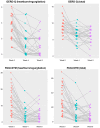Preference for On-Demand Fexuprazan Therapy in Gastroesophageal Reflux Disease: A Prospective Cohort Study
- PMID: 39852211
- PMCID: PMC11766820
- DOI: 10.3390/jpm15010019
Preference for On-Demand Fexuprazan Therapy in Gastroesophageal Reflux Disease: A Prospective Cohort Study
Abstract
Introduction: Maintenance therapy is crucial in managing and preventing symptom relapse in gastroesophageal reflux disease (GERD), with continuous and on-demand therapy being the common approaches. However, maintenance therapy using potassium-competitive acid blockers (P-CABs), such as fexuprazan, remains incompletely evaluated. Methods: This single-center, single-arm, prospective cohort study enrolled individuals with weekly heartburn or acid regurgitation and confirmed erosive esophagitis. The participants received 40 mg fexuprazan daily for 4 weeks as initial therapy, followed by 4 weeks of maintenance therapy. Patients chose either continuous or on-demand therapy for maintenance, according to their preference. The primary endpoint was the proportion of patients selecting on-demand therapy. The symptom scores were assessed using the GERD questionnaire (GERD-Q) and patient assessment of upper-gastrointestinal-disorders symptoms questionnaire (PAGI-SYM). Results: The 31 included participants showed a significant reduction in symptom scores after initial treatment (baseline vs. 4-week: GERD-Q, 9.0 vs. 6.5, p < 0.001; PAGI-SYM, 29.0 vs. 10.8, p < 0.001). Twenty-one (67.7%) patients chose on-demand therapy after initial treatment. The symptom scores did not differ significantly before and after maintenance therapy (4-week vs. 8-week: GERD-Q, 6.5 vs. 6.0, p = 0.225; PAGI-SYM, 10.8 vs. 9.0, p = 0.354). Although this relation was not significant, patients experiencing larger decreases in symptom scores tended to prefer on-demand therapy. After maintenance therapy, the symptom scores did not differ between continuous and on-demand therapy (GERD-Q, 5.3 vs. 6.3, p = 0.342; PAGI-SYM, 9.4 vs. 8.8, p = 0.611). Conclusions: Fexuprazan was effective as an initial and maintenance therapy in patients with GERD who showed typical symptoms. Approximately 68% of the patients preferred on-demand therapy as a maintenance treatment. Based on the patient's preference for maintenance therapy, symptom control did not differ between continuous and on-demand therapy.
Keywords: fexuprazan; gastroesophageal reflux disease; maintenance therapy.
Conflict of interest statement
C.H.P. received research funding related to this study from Daewoong Pharmaceutical company. The Daewoong Pharmaceutical company was not involved in the design of this study, its conduction and analysis, or the interpretation of study results.
Figures




References
-
- Hunt R., Armstrong D., Katelaris P., Afihene M., Bane A., Bhatia S., Chen M.H., Choi M.G., Melo A.C., Fock K.M., et al. World Gastroenterology Organisation Global Guidelines: GERD Global Perspective on Gastroesophageal Reflux Disease. J. Clin. Gastroenterol. 2017;51:467–478. doi: 10.1097/MCG.0000000000000854. - DOI - PubMed
-
- Bayerdorffer E., Bigard M.A., Weiss W., Mearin F., Rodrigo L., Dominguez Munoz J.E., Grundling H., Persson T., Svedberg L.E., Keeling N., et al. Randomized, multicenter study: On-demand versus continuous maintenance treatment with esomeprazole in patients with non-erosive gastroesophageal reflux disease. BMC Gastroenterol. 2016;16:48. doi: 10.1186/s12876-016-0448-x. - DOI - PMC - PubMed
Grants and funding
LinkOut - more resources
Full Text Sources

